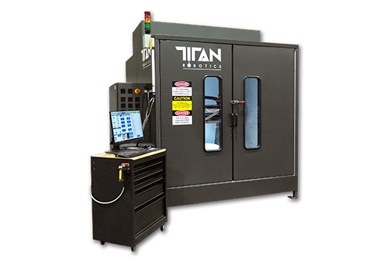Titan Launches Hybrid Pellet Extrusion System
Titan’s hybrid Atlas-HS features 3D printing and machining capabilities on a single platform, enabling additive manufacturing in industrial production.

Titan Robotics Ltd., a provider of additive manufacturing (AM) solutions and equipment, has released its Atlas-HS system which incorporates a pellet extrusion system with a three-axis milling system on the same gantry. The new machine incorporates hybrid additive and subtractive technology enabling 3D printed parts to be machined both during and after the printing process. Taking production AM to the next level, the Atlas-HS shortens cycle times and produces smooth and accurate end-use 3D printed parts, the company says.
The Atlas-HS features a heated chamber for printing high-performance polymers, including CF-PEI, GF-PEKK, nylons and more, and is available with print volumes of 42" × 42" × 44" up to 50" × 50" × 72", with custom size options also available. The machine gives industrial customers flexibility with a spindle and the option to incorporate both Titan’s pellet and filament extruders on the same gantry.
The Atlas-HS broadens the capabilities for Titans’ customers to utilize its multihead systems in new applications, the company says. As a production AM solutions provider, Titan’s Atlas-HS is designed and built to address the needs of customers in industries such as aerospace, automotive, foundry, consumer products and appliances, government agencies and more. The hybrid additive and subtractive system on the Atlas-HS enables users to quickly and cost-effectively manufacture end-use parts, patterns, molds, tools, jigs and fixtures.
The machine enables industrial users to 3D print a near-net shape part with pellet extrusion and then post-machine it to meet final part requirements, as well as produce complex geometries with in-situ machining capabilities. That can shorten cycle times and lower the cost of part production. Further cost savings are achieved by reducing capital expenditures with a single machine incorporating two processes and by utilizing pellet feedstocks, which can cost up to 10 times less than traditional filament feedstocks.
Related Content
-
In Armenia, Personalized 3D Printed Shields Improve Fit for Prosthetics
The ongoing conflict in Armenia has left many of its citizens sustaining injuries, especially the loss of limbs. With difficulty in accessing quality health care, many people have poorly fitted prosthetics. The solution lies in 3D modeling and printing customizable prosthetic case covers enabling better healing outcomes and comfort for patients.
-
NIOSH Publishes 3D Printing Safety Guide for Nonindustrial Settings
NIOSH has published a 3D printing safety guide for small businesses and other additive manufacturing users such as makerspace users, schools, libraries and small businesses.
-
For Coast Guard, AM Adoption Begins With “MacGyver-ish” Crew Members Who Are Using 3D Printing Already
AM suits the Coast Guard’s culture of shipboard problem-solving, says Surface Fleet AM lead. Here is how 3D printers on ships promise to deliver not just substantial cost savings but also an aid to crew capabilities and morale.










